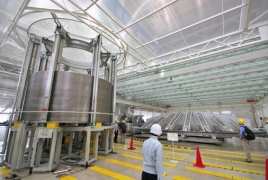Scientists take major step towards achieving nuclear fusion June 22, 2017 - 14:34 AMT PanARMENIAN.Net - With the potential to provide almost limitless energy, free of any radioactive by-product or greenhouse gases, nuclear fusion is the goal many are aiming to achieve. Creating a system to harness the power of nuclear fusion is proving difficult, however. Now, researchers think they have taken a step closer to that goal, Wired said. It takes immense pressure and temperatures of about 150 million degrees to get atoms to combine in a fusion reactor. Runaway electrons can wreak havoc in the fusion reactors currently under development and could destroy a reactor without warning. The new technique works by decelerating these runaway electrons. This is done by injecting heavy ions, such as argon or neon in the form of gas or pellets, into the reactor. Electrons collide with these atoms, slowing them down. "When we can effectively decelerate runaway electrons, we are one step closer to a functional fusion reactor," said Chalmers University of Technology's Linnea Hesslow, co-author of the paper. “Considering there are so few options for solving the world's growing energy needs in a sustainable way, fusion energy is incredibly exciting since it takes its fuel from ordinary seawater.” Nuclear fusion is the energy source of the stars. Deep in our Sun's core, hydrogen atoms slam into one another at high speed, getting "mashed" together to form helium atoms, all the while releasing copious amounts of energy. Creating viable fusion energy on Earth has been an ideal since the dawn of the Atomic Age. With true fusion power, the amount of water you use in a single shower could provide all your energy needs for a year. But for six decades, fusion has remained a far-off dream. "The interest in this work is enormous," said Professor Tünde Fülöp, who led the students' work on the paper. “The knowledge is needed for future, large-scale experiments and provides hope when it comes to solving difficult problems. We expect the work to make a big impact going forward.” At the moment, all eyes are on the research collaboration developing the ITER reactor in southern France. "Many believe it will work, but it's easier to travel to Mars than it is to achieve fusion," continued Hesslow. “You could say that we are trying to harvest stars here on Earth, and that can take time. It takes incredibly high temperatures, hotter than the centre of the Sun, for us to successfully achieve fusion here on Earth. That's why I hope research is given the resources needed to solve the energy issue in time.” Photo: Getty Images Yerevan will host the 2024 edition of the World Congress On Information Technology (WCIT). Rustam Badasyan said due to the lack of such regulation, the state budget is deprived of VAT revenues. Krisp’s smart noise suppression tech silences ambient sounds and isolates your voice for calls. Gurgen Khachatryan claimed that the "illegalities have been taking place in 2020." Partner news |